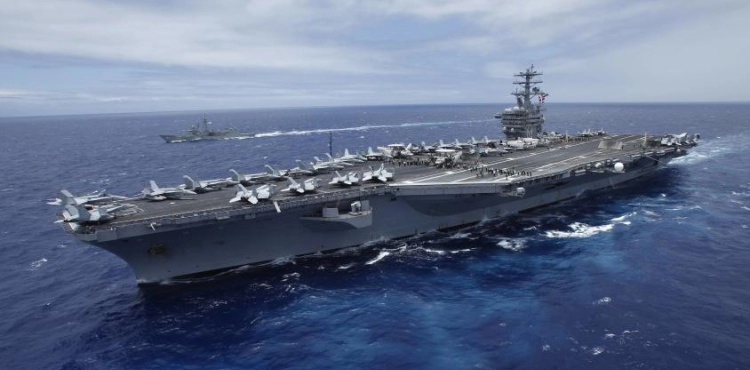The crossing of the USS Abraham Lincoln and its accompanying group this week marks another step in Washington´s efforts to highlight its military presence in the Middle East and reassure its allies, experts and officials say.
In a show of force, the aircraft carrier and other ships crossed the strategic strait, although US President Donald Trump said in a tweet last month that engagement in the Middle East was "the worst decision in US history."
Since then, US forces have taken several steps to assert their historic role in the region where Washington has forged close ties for decades.
It has conducted large-scale exercises, announced increased troop numbers and established a Bahrain-based naval alliance to protect shipping lines in troubled waters.
According to the Pentagon, the last transit of an American aircraft carrier to the Strait of Hormuz dates back to April.
"This show of strength reflects the gap between American verbal assurances in the region and the absence of action on the ground," said Andreas Craig, a Middle East researcher at Kings College in Britain.
"It is a desperate attempt to reassure allies in the Persian Gulf," he said.
For more than seven decades, the United States has played two pivotal roles in the war-ravaged region: the policeman of the Middle East and the guard of the Gulf monarchies against external and regional dangers, most notably Iran.
But recently, in his tweet and statements calling on Gulf rulers to pay for American protection, Trump appeared to suggest redrawing this US engagement strategy, which was born on a US battleship in 1945 during a meeting between Saudi King Abdul Aziz bin Saud and US President Franklin D. Roosevelt.
These controversial positions came at a time when the dispute with Iran has escalated.
Since May, the region has been on heightened tensions over the mysterious attacks against oil tankers, drones and missile strikes against Saudi Aramco oil installations. Iran has been blamed, which has denied any role.
But despite these incidents, including the downing of a US drone, the US avoided reciprocating.
Craig said the dispatch of the aircraft carrier across the Strait of Hormuz "certainly sends a message of firmness and strength after months of Iranian escalation that insulted the United States."
According to the US Navy, the transit of the aircraft carrier group, the strategic strait that separates Iran and the UAE towards the Gulf and its width of 50 km, was planned in advance and without any incident.
Despite Trump´s lack of enthusiasm, the United States still maintains about 60,000 troops in the region and several bases, including the headquarters of the Fifth Fleet in Bahrain.
The Pentagon said it was sending thousands of troops to Saudi Arabia to protect it from "destabilizing" Iranian behavior, for the first time since it left in 2003.
"The United States will certainly not leave the Gulf. Even under the Trump administration, which separated Iran´s nuclear program from Gulf security, the continued US presence in the region is logical," said Middle East defense expert Alexander Matresky.
"The United States must maintain a concrete threat to Iran," he said.
Earlier this month, US forces hosted a group of journalists at a base in Bahrain to attend a military exercise in which more than 60 countries took part, kilometers from Iran.
Journalists in the Blackhawk helicopter were taken to a British ship for a mine-detection and demining training.
Two days later, senior US, Western and Gulf military officials participated in the launch of a naval alliance to counter attacks in the Gulf.
Both events carried a single message, according to US officials.
"Our commitment in the region is not short-lived, it is ongoing. We will work as long as we are needed, as long as the threat at sea persists," Alvin Holsey, the newly born coalition leader, said at the launch in Bahrain.
Even as the United States emerges from the Syrian conflict and shies away from its Kurdish allies, the US role in the region rich in energy resources and arms customers cannot end overnight.
The former director of the CIA, Gen. David Petraeus, said the relationship between Washington and the Middle East resembled those within criminal gangs.
"Trying to get out of the Middle East is like Michael Corleone´s attempt to leave the mafia. We can understand why, but we know it´s impossible," he said at a session of the Beirut Institute political summit in the UAE capital last month.
"You can try, but you will be called back," Petraeus said. "In fact, no one can replace us."












